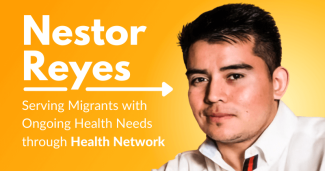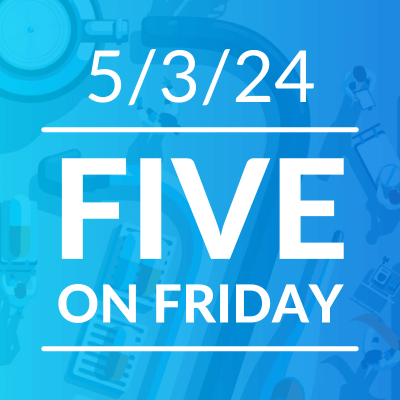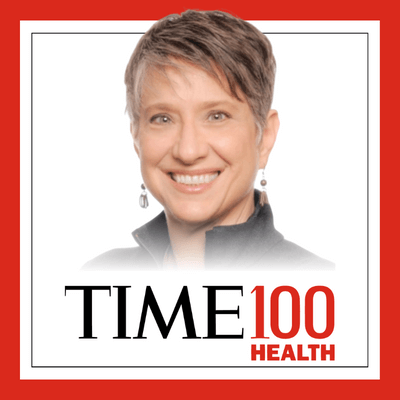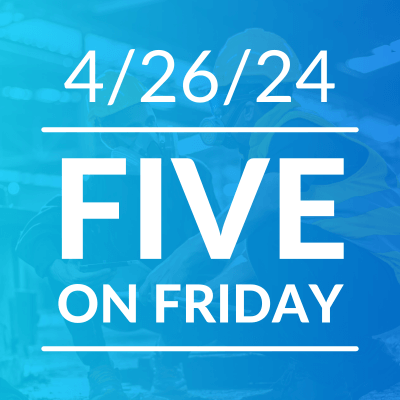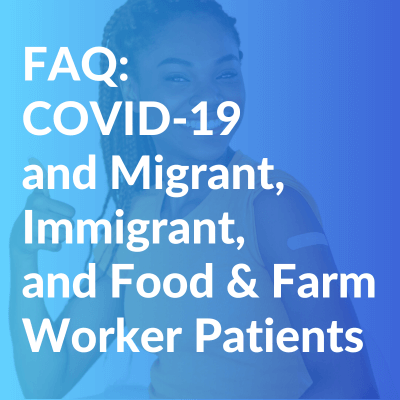Nestor Reyes: After Childhood Immigration and Early Career in Finance, He Now Serves Migrants with Ongoing Health Needs through Health Network
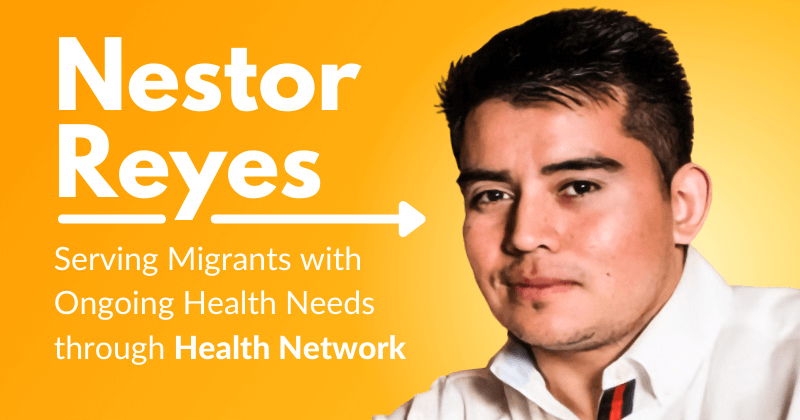
[Editor’s Note: Our Health Network Associates save lives, every week. They provide the attentive, often difficult case management for migrants and asylum seekers while migrating who have ongoing health needs and may otherwise be unable to access care. Here, we provide a glimpse into the life of one Health Network Associate, Nestor Reyes. This interview has been edited for brevity. Read other Associates’ stories: Enedelia, Saul, Alma, and Robert.]
Nestor Reyes, Health Network Associate, came to the US when he was four years old, joining his parents as they pursued a better life for their children. We recently sat down with him to hear about his life and work. Here, after over four years with Health Network, Nestor reflects on the people he has helped, and the lives he has changed. Nestor believes he may eventually pursue firefighting, another important service to our communities. In the meantime, he works with dozens of patients each month to help them find care in their new communities as a Health Network Associate.
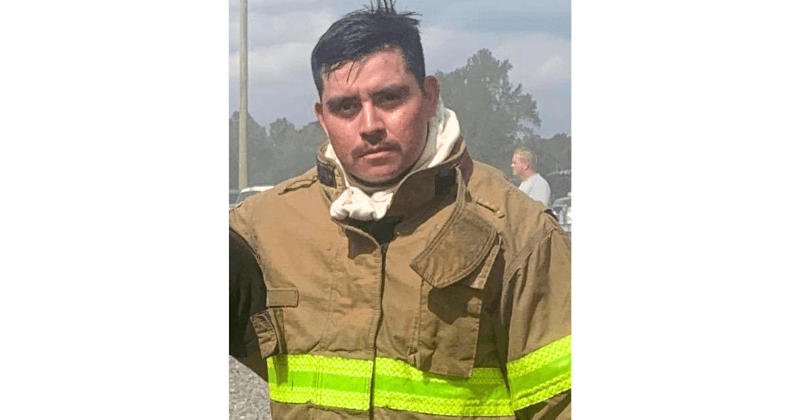
Tell us about yourself.
I was born in Coahuila, Mexico. It's a northern state in Mexico, one of the closest to the Texas border. At the age of four, my dad decided to move up here on his own. He was here for about six months, working, trying to save up money to try and get the rest of the family up here to join him. He just wanted a better life for all of us, a better future for his kids. There were just many more opportunities. After that, my dad got enough money and he was able to get us all over here. I was nearly five years old. Ever since then, my family has lived in Dallas. I know almost nothing about my town back in Mexico, but I do know it's a very small town. Pretty rundown, poor. Everyone knows each other and within the area because of how small it is.
I did all of my schooling in Dallas. Spanish is my first language, but I am fluent in both English and Spanish. I ended up going to college in Kansas, at a small private liberal arts college called Bethel College. I went to school on a soccer scholarship. I played over there for all four years, but I lived there for five years.
I got a business administration degree from the school. After graduating, I got a job at a bank in Kansas, but I had no plans of what I was going to do. I worked there for about nine months, not even a year. I was kind of just settling for what was available at the time. Then I decided I was over the small-town life -- the school and bank were in a very small town. So, after that, I decided to move back to Dallas. I moved back in with my parents. I was there for maybe a month or two months before I decided it was not what I wanted. After being on my own in Kansas for five years, I had gotten used to it. I live in Austin now. I had friends and family here, so I said, ‘You know what? Austin sounds fun. I'm going to just pack up and go.’ I had a few interviews lined up. I didn't have a job yet, but I just decided to go.
Is that when you ended up at MCN?
I landed another job in finance first. I was working in personal loans. And again, I did that for about eight months, it was another pretty short-term job. I didn’t like it, so the whole time I was there, I was still actively looking for other jobs.
I ended up at MCN because of an ex-coworker here -- Luis, a former Health Network Associate. I went to high school with him in Dallas. He is a year older than I am, so we were in school together. I ended up moving in with him and some friends of his while I was still working at the bank, but he knew I was unhappy.
MCN had a job opening. He told me about it. And I got really excited because I knew what he did, I knew what MCN did and the people they worked with. It was intriguing, right off the bat. I mean, I can't necessarily relate to all these migrant farmworkers, but I can relate to them migrating for a better life, doing it for themselves and especially for their kids.
Tell me a little about your family.
I'm the youngest of four. Everyone is in Dallas still. I’m a first-generation college student. I was the first one of my siblings that went through college and finished school. I go back – not as often as I should -- a handful of times per year. I try to go back for big events usually, or sometimes I just pop in randomly and my parents always appreciate that. It's always nice to see them smile. It makes me realize how they miss me.
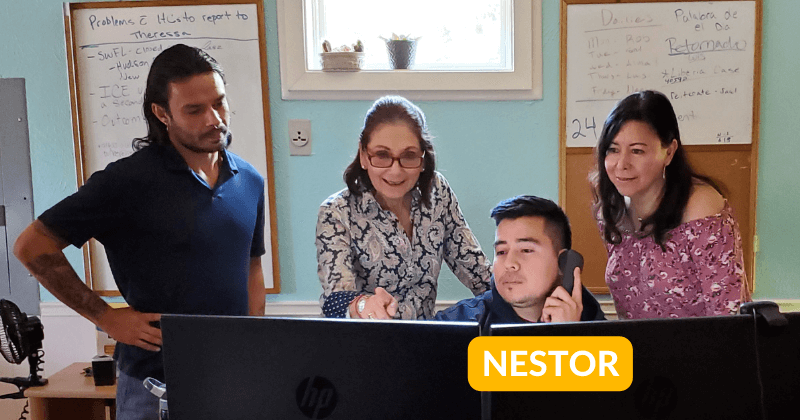
How was the transition from working in business and finance to Health Network?
I think what helped me from my time working in finance was working with people – I was already talking to customers every single day and working with them in person. I think that really helped me with the transition. It made it easier. I would say the hardest things were learning the database and the situation-based scenarios, because every case is different. They require different attention. They have different needs.
At the beginning, I didn’t have my own caseload. I was shadowing someone and the work they were doing. But when I got my own caseload, it was very eye opening and you just get a great feeling, a great sensation of how grateful these people are. Just the words they use, the way they talk to you on the phone, you can hear by their tone of voice how grateful they are. The way I see it, I feel that they think that they're here alone and no one’s here to help them. They're literally strangers in a foreign country, not in a bad way, but everything’s new to them. They don't know how things work in our system and all the back doors and whatnot we can help them with. And the fact that we're there, that we're available to help them. That's probably the biggest gratification that I get out of working at MCN. That has made me realize I'm doing something meaningful. I'm helping people and I get to hear that every single day.
How long have you been with MCN now?
I started here in late 2018, I believe. So it’s been four years, four and a half?
Do you have any standout cases that you can think of that felt particularly impactful more recently?
There was a woman that was climbing over the border wall and as she was climbing, she fell. She fell into the US and ended up fracturing several bones. I can only imagine the pain. Whenever I would call her, I could hear the pain in her voice. She hadn’t received any care.
There was just so much back and forth with different clinics, health departments, organizations. This is probably the one that stood out the most, partly because of how long it took to get the specialty care she needed. There were so many programs, so many hoops to jump through to try and get her financial assistance, considering her status, and transportation.
In the end we were able to get her the care she needed. I think the case is still open, but she did receive the care she needed, and she was doing better, last time I spoke to her. I'm speaking to her probably next week, or the following week. And that will be one of the one of the final follow-ups we do with her before closing her case.
How long have you been following that case?
Around six to eight months. It's been a while. She ended up having some other issues as well. She was having some pain and discomfort while she had some screws in her leg. And so, we had to get her in to get that checked out and get that adjusted.
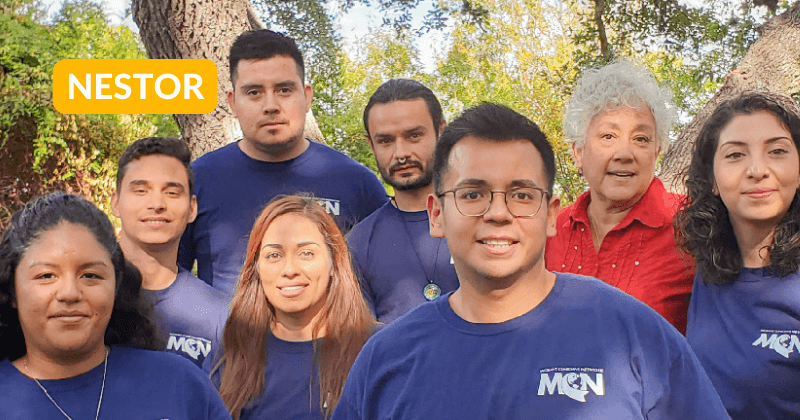
Another thing we try to do with these profiles is bring in a little bit of your personal life. So, what do you do on your weekends?
On the weekends, I spend a lot of my time playing soccer. I love soccer. I grew up playing soccer, played in college, and, to this day, I play on weekends.
But, other than that, I'm spending time with my wife Brittany, or I'm here at home just watching movies, watching TV. We don't have kids, so we spend a lot of our time out with friends. We go out to a random place, have a few drinks, go play some games somewhere. We like to just get out, support the city. There's so much to do here. So many outdoor activities.
Earlier you mentioned that Spanish was your first language, tell me a little about how you’ve used English and Spanish over the years.
I grew up speaking Spanish. I was seven when I started picking up English. I guess I caught on pretty quickly because now it's my preferred language, it's my dominant language, especially living in Kansas. That's all I was using. The school I went to, there were very few Hispanics. I think there were probably eight Hispanics in the whole school and we all knew each other because we were the only Hispanics. So, using my Spanish was not very common out there -- I pretty much didn't use it for five years. It's not that I lost it. It's always been there. But being here at MCN, I use it daily now.
I assume it probably took a little bit of readjusting back to using it when he first joined Health Network.
Definitely. I learned it formally but outside of like school I used it with my family informally. I would use a ton of slang terms and whatnot, but working with MCN and I'm like, ‘OK, I have to use my formal Spanish.’ But even then, it's funny because you're speaking to your patients, trying to be very formal. But then they'll throw some slang at you. And then, I can't help but laugh. So, I can let loose a little bit and speak to them how they’re speaking to me.
How does your immigration experience inform the way that you work with Health Network patients?
I can relate, not that it is the same situation, but I can relate, coming from a family that immigrated here. Not knowing anything, not knowing the system.
When I'm working with these patients, I understand their concerns. They have so many questions. It gives me joy, helping these people because of that. It helps connect me back to my roots.
- Log in to post comments
